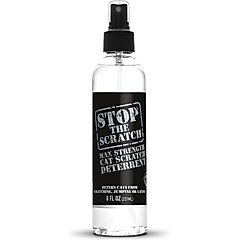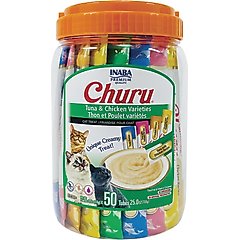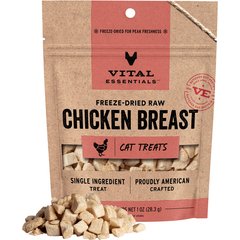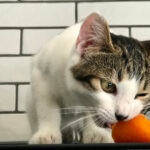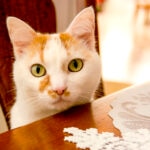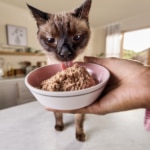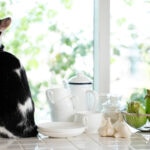What Can Cats Not Eat? 13 Types of Toxic Foods to Avoid
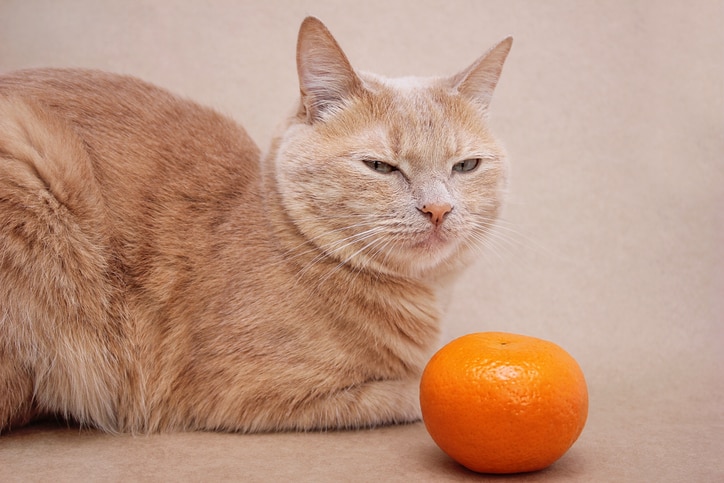
Photo by Yuliya/iStock/Getty Images Plus
It can be hard to ignore your cat’s adorable pleas for a bite of your food. But while some human foods are safe for cats in small amounts, many can be harmful or even toxic. Plus, cats require a carefully balanced, meat-based diet. Too much human food (even the “safe” kind) can cause health issues.
So, what can cats not eat? Read on to learn which foods should stay far out of paw’s reach.
Key Takeaways
- Many human foods—including chocolate, onions, grapes, caffeine, alcohol, and xylitol—are toxic to cats.
- High-fat, salty, raw, citrus, and dairy foods can also cause serious health issues.
- Signs of poisoning include vomiting, lethargy, tremors, or breathing problems.
- If your cat ate something toxic, call the Pet Poison Helpline at 855-764-7661.
Toxic Foods for Cats
Even a small bite of the wrong food can be harmful to your cat. Here are the human foods your kitty should never eat.
Chocolate
With chocolate, the danger is a stimulant in cocoa beans called theobromine, says Bethany Hsia, DVM, a veterinarian and the founder of CodaPet. Even small amounts can cause vomiting, tremors, seizures, or life-threatening heart issues.
“The darker the chocolate, the more theobromine, making dark chocolate particularly dangerous,” Dr. Hsia explains. Baking chocolate and cocoa powder are the most toxic to cats.
Onions, Garlic, Chives, and Leeks
Onions and garlic can damage red blood cells in cats, leading to a dangerous condition called hemolytic anemia, says Michael Hyder, DVM, medical director at VEG ER for Pets in Palo Alto, California.
“Whether raw, cooked, powdered, or dehydrated, all forms are toxic,” he says. Even small amounts, such as those in baby food, soup or broth, or leftovers, pose a risk.
Grapes and Raisins
Grapes and raisins have been linked to severe kidney damage that can lead to acute kidney failure, Dr. Hsia explains. Tartaric acid, a compound found in both, is believed to be the toxic component.
Cream of Tartar and Tamarinds
Speaking of tartaric acid, avoid cream of tartar and tamarinds, which both contain it. Cream of tartar is a common ingredient in baked goods.
Caffeine
Caffeine is a stimulant that affects cats much more strongly than it affects humans. It can cause restlessness, tremors, irregular heart rhythm, and seizures. In large enough quantities, it can be fatal.
Alcohol
Alcohol can make cats seriously ill, even in small amounts. It depresses the nervous system, and can lead to dehydration and low blood sugar. Because of their small size, it doesn’t take much to cause alcohol poisoning, which can be life-threatening.
In addition to keeping cats away from alcoholic beverages, be mindful of foods or desserts that might include alcohol.
Xylitol
“This artificial sweetener is extremely toxic to pets, especially dogs, but it can also be dangerous for cats,” Dr. Hyder says. “Xylitol causes a rapid drop in blood sugar and can lead to liver failure.”
Dr. Hyder advises keeping anything labeled “sugar-free” or “low calorie” out of your cat’s reach, as these products often contain xylitol.
Peanut butter is another popular product that may contain xylitol—but cats should avoid peanut butter anyway.
High-Fat Foods
Rich, fatty foods can cause digestive upset or trigger pancreatitis, a painful and potentially life-threatening inflammation of the pancreas.
Avoid giving your cat things like:
- Bacon and sausage
- Fat trimmings from meat
- Fried or greasy foods
- Gravy or drippings
Raw Eggs, Meat, and Fish
Raw foods aren’t inherently dangerous, but they may contain pathogens, such as salmonella, E. coli, campylobacter, and avian influenza. These bacteria and viruses can cause serious illness, especially in young, senior, or immunocompromised cats. (Raw fish can also be an issue due to thiaminase, which depletes vitamin B1.)
Raw Yeast Dough
While baked bread in small amounts is usually safe, raw dough containing yeast is off limits.
“When eaten, the yeast in the dough continues to ferment in the warm, moist environment of a cat’s stomach,” Dr. Hsia explains. This process produces alcohol and carbon dioxide gas, which can cause alcohol poisoning and a potentially life-threatening condition called gastric dilatation-volvulus.
Citrus Fruits
The flesh of oranges, lemons, limes, and other citrus fruits isn’t toxic to cats, but their peels contain essential oils and other compounds that can cause skin irritation, vomiting, diarrhea, and depression of the central nervous system.
Common citrus foods to avoid include:
- Oranges
- Lemons
- Limes
- Grapefruits
- Citrus peels, juices, and essential oils
Salty Foods
Cats receive all the salt they need via cat food. Many human foods contain far more sodium than their bodies can safely handle. Excess salt can disrupt a cat’s electrolyte balance, leading to vomiting, diarrhea, muscle twitching, and excessive thirst. In severe cases, it can be fatal.
Common salty foods to avoid include:
- Salted chips and pretzels
- Canned fish, especially when in brine, flavored, or smoked
- Popcorn with added salt
- Processed meats like bacon, ham, and deli slices
- Salt-heavy broths, soups, or gravies
Dairy
Most adult cats don’t produce enough lactase (the enzyme needed to digest lactose), making it difficult for them to tolerate dairy. While some cats can handle very small amounts, milk and other dairy products often cause diarrhea and stomach upset.
So, keep your cat away from milk, butter, yogurt, and cheese.
What Are the Signs Your Cat Has Eaten Something Toxic?
“Cats can be subtle when they’re not feeling well, so it’s important to know the early signs of poisoning,” Dr. Hyder says.
Symptoms vary by food and the amount consumed, but common warning signs include:
- Vomiting or diarrhea
- Drooling or foaming at the mouth
- Lethargy, weakness, or collapse
- Shaking, twitching, or tremors
- Loss of coordination or unusual behavior
- Increased heart rate or trouble breathing
- Pale gums
- Yellowing of the eyes or skin
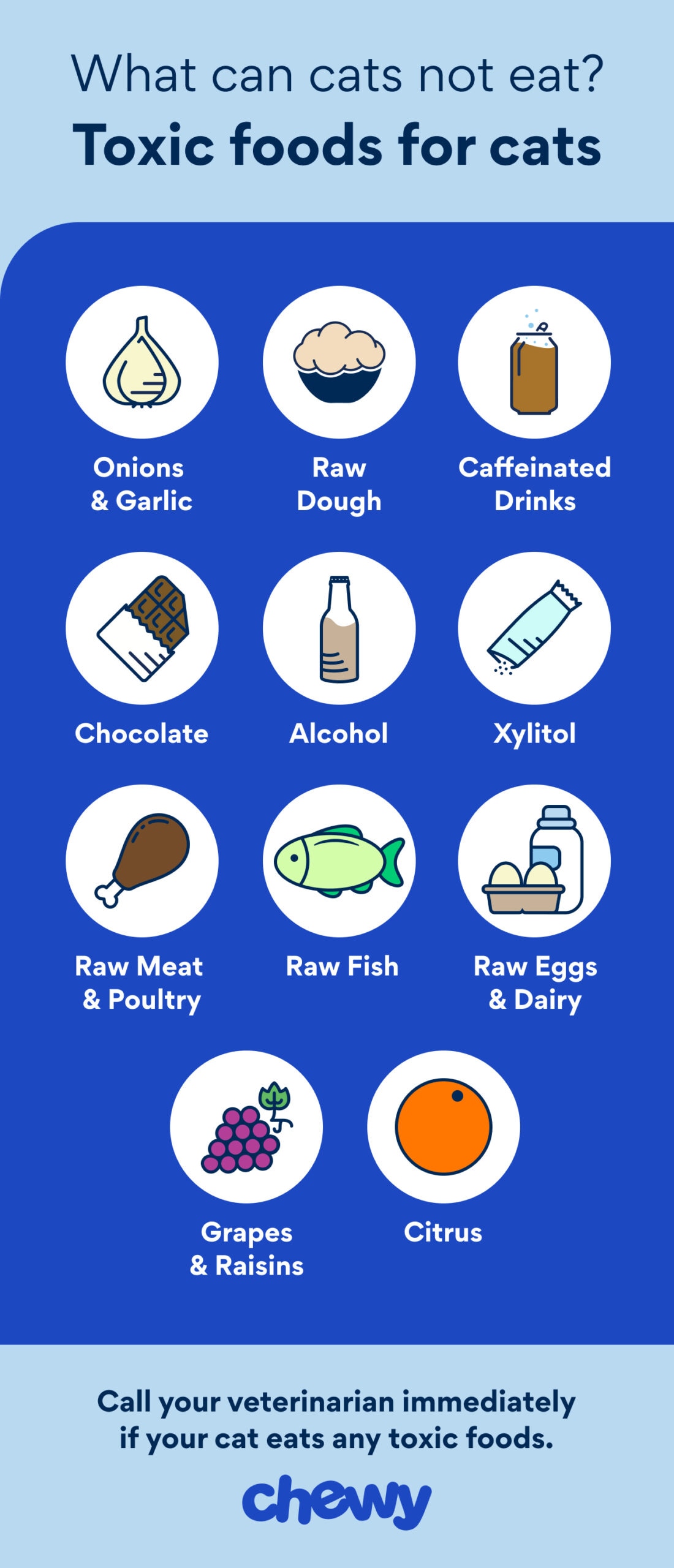
Photo by Chewy
What To Do if Your Cat Eats Something Toxic
If you think your cat has eaten something toxic, time is critical—even if they are not showing signs. Symptoms can develop or worsen quickly. Here’s what to do:
- Remove access to the toxin. Gently take it away and make sure there’s no more within reach.
- Call your veterinarian, an emergency pet clinic, or the Pet Poison Helpline at (855) 764-7661. They can assess if this is an emergency.
- Head to an emergency vet clinic if your vet or the helpline recommends immediate care, or if your cat is showing symptoms.
- Bring relevant information with you. If possible, take the packaging or a list of ingredients from whatever your cat ingested.
- Don’t induce vomiting unless a veterinarian tells you to. Doing so can harm your cat.
How To Prevent Your Cat From Eating Toxic Foods
Cats are naturally curious (and often sneaky) when it comes to exploring food around the house. Here are a few proactive steps to take:
- Keep human food out of reach in sealed containers.
- Use a trash can with a secure lid or keep it in a cabinet.
- Wipe counters, dispose of food scraps, and wash dishes promptly.
- Don’t feed table scraps.
- Make sure family and guests know not to share food with your cat.
- Use double-sided tape or a cat deterrent spray, such as Emmy’s Best Pet Products Stop the Scratch Spray, to keep cats off counters or away from food storage areas.
Recommended Product
Of course, that doesn’t mean your cat shouldn’t get to indulge once in a while—safely. Keep a stash of cat treats just for them and, pretty soon, they’ll lose interest in your food.
Recommended Products
FAQs About What Cats Can’t Eat
What is the healthiest thing to feed a cat?
A high-quality, balanced commercial cat food that is AAFCO compliant is the healthiest option. Cats are obligate carnivores and require a meat-based diet.
Can cats eat grapes?
No. Grapes and raisins can cause sudden kidney failure in cats, even in small amounts.
What human foods can cats eat?
In moderation, some cats can safely enjoy small portions of plain, cooked, animal-based foods such as chicken, turkey, fish, and egg. Some vegetables and fruits may also be safe in moderation. Ask your veterinarian first.
Can cats eat onions?
No. Onions are toxic to cats and can damage their red blood cells, potentially causing anemia. This includes raw, cooked, powdered, or dehydrated forms.
Can cats eat applesauce?
It’s best to avoid it. While plain apples (without seeds) aren’t toxic to cats, applesauce is high in sugar and often contains added spices or preservatives.

